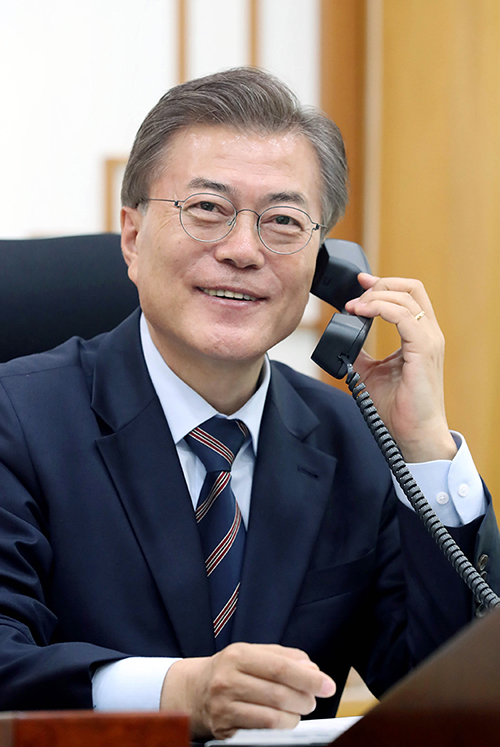
President Moon Jae-in talks on the phone with leaders from Australia, the U.K., Germany and Russia on May 12, focusing on ways to expand cooperation with each country.
By Jeon Han and Lee Hana
Photos =Cheong Wa Dae
May 14, 2017 | Cheong Wa Dae
President Moon Jae-in held phone conversations with leaders from Australia, the U.K., Germany and Russia on May 12.
The president spoke first with Australian Prime Minister Malcolm Turnbull at 2:30 p.m. for 20 minutes. During the call, the leaders discussed the development of their countries’ relationship and issues of mutual interest, such as the North Korean nuclear weapons issue. They agreed to cooperate on overcoming the spread of trade protectionism.
“Ever since the Korea-Australia free trade agreement entered into force, Australian beef and wine have been served on countless dining tables here in Korea. Meanwhile in Australia, sales of Korean automobiles and home appliances have been on the rise,” said President Moon.
“Our two countries are part of MIKTA, the cross-regional partnership between Mexico, Indonesia, Korea, Turkey and Australia, a group that has been cooperating on a number of issues on the international stage. It’s our hope that this multilateral partnership will only grow further in the future,” the president said.
To this the Prime Minister Turnbull said, “We agree that free trade needs to be protected and that we should take action against protectionism.”
The two leaders agreed to increase their cooperation on halting North Korea’s nuclear weapons program, and agreed to hold a 2+2 meeting involving their foreign and defense ministers. Finally, they invited each other to their countries and expressed hopes to meet in person in the near future.
Two hours later, the president held a phone conversation with British Prime Minister Theresa May.
“The U.K. dispatched the second largest contingent of troops to Korea during the Korean War (1950-53), after the U.S.,” said President Moon. “Currently, the U.K. is the country with the largest number of Korean expats in Europe. Every year, around 400,000 Koreans visit the U.K. annually. Koreans have an affinity for the U.K., a popular country among our tourists. Moreover, Britain is our second largest partner in all of Europe in terms of trade and investment. We are hopeful that our close economic relationship will not be affected by the U.K.’s exit from the European Union (EU) and that they will continue to flourish,” he said.
When President Moon asked for Britain’s support in denuclearizing North Korea, the British prime minister agreed to help, promising to share her country’s experience in ending Iran’s nuclear weapons issue. She expressed her wish to expand her country’s trade relations with Korea.
Next, the president spoke with German Chancellor Angela Merkel, who invited him to visit Berlin on his way to the G20 summit, set to be held in Hamburg, Germany, in July.
“Under your leadership, Germany has played a pivotal role in addressing a number of issues affecting the EU, including the global financial crisis, the refugee crisis as well as the impact of Brexit. Germany is not only Korea’s largest trade partner in Europe, it’s also a leader in the fourth industrial revolution. I hope our two countries will increase our cooperation on IT and other sectors related to the fourth industrial revolution, and create new engines of growth,” said President Moon.
Furthermore, the president requested that Germany help Korea resolve Pyongyang’s nuclear weapons issue, noting that the European power had played an important role in ending Iran’s nuclear ambitions.
“Germany is a country that understands the tragedy and hardship that affects a divided nation. As the Korean government lays the groundwork for reunification with support from the international community, I ask that Germany continue to provide us with active support,” he said.
Chancellor Merkel congratulated the president on his inauguration. She said, “We are pleased Korea has overcome a period of difficulty and has regained stability as an administration.” Promising to work closely with Korea in confronting the North Korean nuclear weapons issue, she expressed an interest in the Moon administration and agreed to work closely with Seoul.
At 8 p.m., President Moon spoke with his Russian counterpart, Vladimir Putin.
During the talks, President Moon said he had plans to send a special envoy to Russia in the near future. President Putin agreed to personally meet with the Korean envoy.
“Russia is a direct neighbor to the Korean Peninsula, and an optimal partner for achieving peace and prosperity in Eurasia,” said President Moon. He then proposed that the two countries expand bilateral cooperation on three major areas.
First, the president stressed the need to strengthen strategic cooperation between Korea and Russia and to put an end to Pyongyang’s nuclear ambitions.
“I hope that Russia will play a constructive role in helping to put North Korea back on the path to denuclearization. I, too, will be seeking measures to resume the South-North Korean dialogue and the Six-Party Talks at the earliest date,” said President Moon.
Second, the president asked that Seoul and Moscow boost cooperation on the energy sector while jointly developing the Arctic for new shipping routes.
Third, the president encouraged joint cooperation on Russia’s far east Siberian region.
“I look forward to the day when the Siberian natural gas pipeline stretches all the way into our borders, and when our countries’ railroads meet in the middle. I will work hard to make this happen,” said the Korean president.
“Russia is ready to continue cooperation on all the areas mentioned today. We are also ready to play a constructive role in helping to resolve the North Korean nuclear weapons issue,” said President Putin.
hanjeon@korea.kr